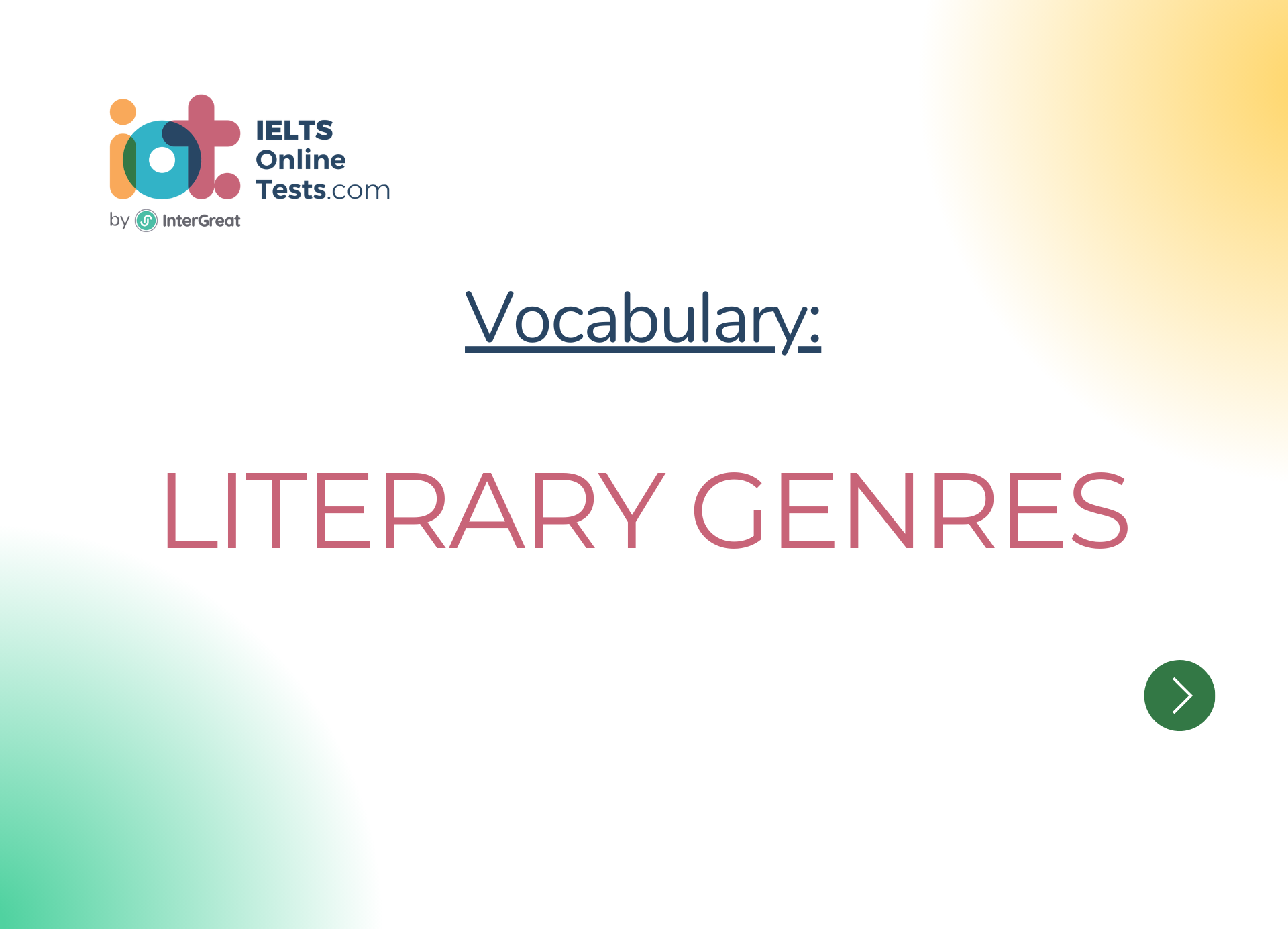
Literary genres
Here are some vocabulary words related to literary genres for IELTS band scores 4.5-6.0:
Fiction:
Literary works that are based on imaginary or invented events, characters, and settings.
Non-Fiction:
Literary works that present factual information and real events.
Novel:
A long fictional narrative that typically explores complex characters and multiple plotlines.
Short Story:
A brief fictional narrative that focuses on a single event or character.
Poetry:
Literary works that use rhythmic and metaphorical language to evoke emotions and express ideas.
Drama:
Plays and scripts intended for performance, often featuring dialogue and character interactions.
Comedy:
Literary works intended to amuse and entertain through humor and lighthearted situations.
Tragedy:
Literary works that portray the downfall and suffering of a central character, often due to a fatal flaw.
Romance:
Literary works that center around romantic relationships and emotions.
Mystery:
Literary works that involve the investigation and resolution of a puzzling event or crime.
Science Fiction:
Literary works that speculate on future technologies, scientific advancements, and alternate realities.
Fantasy:
Literary works that incorporate magical or supernatural elements and often take place in fictional worlds.
Horror:
Literary works that evoke feelings of fear, terror, and suspense.
Biography:
A non-fictional account of a person's life, written by another individual.
Autobiography:
A non-fictional account of a person's life, written by themselves.
Memoir:
A personal account of specific experiences or events from a person's life.
Essay:
A short literary piece that presents the author's opinion or perspective on a particular topic.
Historical Fiction:
Fictional works set in a past historical period, often blending real events with fictional characters.
Classic:
Literary works that are considered to be of lasting significance and enduring popularity.
Adventure:
Literary works that involve exciting and daring experiences or journeys.
Satire:
Literary works that use irony and humor to criticize and mock human vices and follies.
Mythology:
Literary works that consist of traditional stories and beliefs of a particular culture or society.
Thriller:
Literary works that create intense excitement and suspense, often involving danger and action.
Graphic Novel:
A novel or story presented in a comic-book style format, combining illustrations and text.
Detective Fiction:
Literary works that revolve around crime-solving and detective characters.
Realism:
Literary works that depict ordinary and everyday life with accuracy and attention to detail.
Historical Drama:
Dramatic works set in a historical period, often portraying real historical figures and events.
Dystopian:
Literary works that depict a dark and oppressive future society.
Adventure:
Literary works that involve exciting and daring experiences or journeys.
Suspense:
Literary works that create a sense of anticipation and tension, keeping the reader engaged and curious.
Epic:
A long narrative poem that tells the heroic deeds of a legendary figure or a nation's history.
Biographical Novel:
A fictionalized account of a person's life that blends elements of biography and fiction.
Allegory:
A literary work in which characters and events represent abstract ideas and moral principles.
Classicism:
A literary movement that emphasizes order, harmony, and adherence to classical principles.
Romanticism:
A literary movement that emphasizes individualism, emotion, and nature's beauty.
Gothic:
Literary works that feature elements of horror, mystery, and the supernatural, often set in eerie locations.
Science Fantasy:
Literary works that combine elements of science fiction and fantasy.
Autobiographical Novel:
A fictionalized account of the author's life, similar to an autobiography.
Magic Realism:
Literary works that blend magical elements with the real world in a matter-of-fact manner.
Prose:
Written or spoken language in its ordinary form, without metrical structure (opposite of poetry).
Sonnet:
A 14-line poem, usually written in iambic pentameter, with various rhyme schemes.
Metaphor:
A figure of speech that describes one thing in terms of another to suggest a likeness between them.
Simile:
A figure of speech that compares two things using "like" or "as."
Personification:
A figure of speech where non-human objects are given human qualities or characteristics.
Irony:
A literary technique where words or situations convey a meaning opposite to their literal sense.
Imagery:
Vivid and descriptive language that appeals to the reader's senses (sight, sound, touch, taste, smell).
Foreshadowing:
A literary device that hints at future events in the story.
Flashback:
A literary device that interrupts the chronological order of a narrative to present events that happened earlier.
Alliteration:
The repetition of the same sound or letter at the beginning of adjacent or closely connected words.
Hyperbole:
A figure of speech that involves exaggeration for emphasis or humorous effect.
Remember to use these vocabulary words in context to reinforce your understanding and improve your English language skills for the IELTS exam. Familiarizing yourself with different literary genres will help you comprehend and analyze various texts during the test. Good luck with your preparation!




